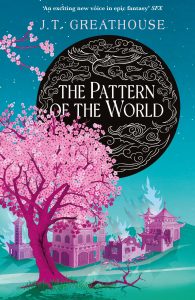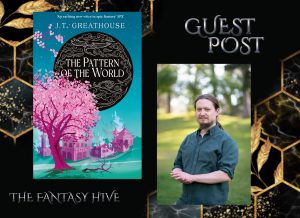Magic as Metaphor: The Philosophy of Pact & Pattern – GUEST POST by J. T. Greathouse (THE PATTERN OF THE WORLD)
Magic as Metaphor: The Philosophy of Pact & Pattern
by J.T. Greathouse
With the Pact & Pattern series coming to a close with the forthcoming release of The Pattern of the World, I’ve been reflecting a bit on the series and what I hoped to accomplish in writing it. One important aspect of the series I’ve been thinking about, and decided to use this opportunity to comment upon, is its treatment of magic.
As I’ve developed as a writer, particularly as a writer of fantasy, one of the things I’ve grown increasingly wary of is the concept of a “magic system.” This may sound hypocritical – the Pact & Pattern series has been lauded at times for its magic system, after all. But even when I was writing The Hand of the Sun King, I was beginning to feel the constraints of this idea which seems to have permeated the fantasy genre in a way that I think is, in fact, quite stifling.
On a fundamental level, magic systems are inescapable in writing fantasy. Essentially, if you can describe how magic works in a story – how characters access it, what effects it has on the practicalities and culture of a world, how, in a meta-narrative sense, it impacts the plot of the story – and if that description is anything other than “I don’t know, magic stuff just happens sometimes,” then that story has a magic system. Even most “soft magic” fantasy worlds can be folded into this paradigm.
Further, some of my favorite fantasy novels not only feature magic systems, but focus on them. Ursula K. Le Guin’s A Wizard of Earthsea is interested in the consequences of using magic irresponsibly, and establishes a relatively soft but nonetheless coherent magic system in order to facilitate an examination of that interest. But, importantly, it is interested in more, and its interest in its magic transcends itself and gestures outward, thematically and philosophically resonating with human experience beyond the bounds of its fictive universe.
 However, for at least the last decade or so – or, at the very least, in the time during which I was writing the Pact & Pattern series – it has felt like the concept of a “magic system” has overshadowed other elements of fantasy writing. New fantasy novels are often discussed by many, and even marketed, not in terms of their characters, their style, or their themes, but in terms of their magic systems. Some of my earlier novel projects – particularly those written just before The Hand of the Sun King – were conceived of primarily as thought experiments centered around a rule set for a magic system. Projects which I found ultimately empty, devoid of any real point or purpose. Thematically vapid. Artistically weak.
However, for at least the last decade or so – or, at the very least, in the time during which I was writing the Pact & Pattern series – it has felt like the concept of a “magic system” has overshadowed other elements of fantasy writing. New fantasy novels are often discussed by many, and even marketed, not in terms of their characters, their style, or their themes, but in terms of their magic systems. Some of my earlier novel projects – particularly those written just before The Hand of the Sun King – were conceived of primarily as thought experiments centered around a rule set for a magic system. Projects which I found ultimately empty, devoid of any real point or purpose. Thematically vapid. Artistically weak.
The reason, I think, that The Hand of the Sun King succeeded as a novel (and was published while these other books will never see the light of day) is because in my frustration with my own failings I came up with an idea that, while perhaps a bit too meta-textual, was nonetheless interesting. A confluence of theme, setting, plot, and character (and, yes, magic system) which not only critiqued my frustrations with the genre itself, but inverted that frustration and directed it into an outward gesture, attempting (perhaps clumsily? perhaps profoundly? I’m still not sure) to use the fictive, fantastical space to say something about how people and societies organize power, how people systematize, in general.
Or, at least I’m trying to say something. If you’ll indulge me (and you have for at least six hundred words; why stop now?) I’d like to unpack that something, insofar as I can without stepping on the toes of the novels in which I attempt to say it.
Humanity finds an enormous amount of utility in creating systems – or, as certain 20th century philosophers preferred to describe them, structures, or discourses. Regardless of the word we use, the thing described is the same: a tool by which facts are established through a process of building atop agreed upon axioms by way of agreed upon methodologies. These facts can then serve as the foundation for the establishment of further facts, each “discovery” or “breakthrough” further scaffolding the construction of the next. The scientific method functions in this way, for example. As does Talmudic law. Or judicial precedent. Or market analysis. Or dialectical materialism. Or gender theory. Or Brandon Sanderson’s rules for magic. Dig beneath a cultural, ideological, or technological tree and you will find the system of roots from which it grows – often the mightier and more fruitful the tree (whether that fruit be to the benefit or detriment of humanity), the deeper and more complex the roots.
For more on this, I highly recommend the work of Michel Foucault – a deeply problematic person and a deeply insightful thinker.
So what the hell does this have to do with Pact & Pattern, and more specifically with its magic system and that “outward gesturing” towards the real world? To say too much might spoil The Pattern of the World, which is a month away from release at time of writing, but I will say what I can.
I set out, in these books, to draw from an interaction of ideas that fascinated me during my college education – the discursive relationship between Daoism and Confucianism during the Ming and Qing dynasties. Confucianism is a profoundly systematic ideology, one heavily invested in definitions, in roles, and in rules, and in how these can provide shape and utility to human life and society. Daoism is almost the polar opposite, chafing against the notion that the world can be effectively described, let alone constrained, by human conceptualization. Further, it is wary that the effort to do so may in fact be deeply harmful, or at the very least sets one up for pain and disappointment when the system fails to map onto reality.
The Hand of the Sun King places this dichotomy front and center – Alder glimpses the numinous reality of magic, in all its complexity and power, and manages to touch it for one disastrous instant. From that moment on, he longs for mastery of magic – mastery of reality – and seeks it first in his grandmother’s Pact with the gods, then in the imperial Canon, and finds both wanting. Both the Pact and the Canon are systems that take this ineffable, numinous thing – magic – and reduce it, by very different means, to something more easily controlled. Something replicable, something that can be institutionalized and taught, conveyed intentionally from one generation to the next rather than something accessed by specific people for reasons that can never be adequately explained. Something useful to society, rather than just random individuals. It is only when Alder – as Foolish Cur – begins to dig with the edge of a knife beneath the surface of the systems he has been taught that he is able to access the numinous again.
But of course, that does not solve all of his problems, as The Garden of Empire and now The Pattern of the World illustrate. Access to the numinous, to unfiltered reality, does not come without its own risks. And it may be that systems are necessary, that order must be imposed at some level, to make sense of the world.
J.T. Greathouse is the BFA nominated author of the PACT & PATTERN trilogy: THE HAND OF THE SUN KING, THE GARDEN OF EMPIRE, and THE PATTERN OF THE WORLD. In addition to writing, he has been a student in Beijing, an ESL instructor in Taipei, a bookseller, and a high school English teacher. His short fiction has appeared, often as Jeremy A. TeGrotenhuis, in Beneath Ceaseless Skies, PodCastle, IGMS, and elsewhere.
Links:
Linktree for social media, newsletter, and website:
Buy the books:
UK: Gollancz Store | Blackwells | Amazon US: Auntie’s Books (signed copies!) | Amazon

